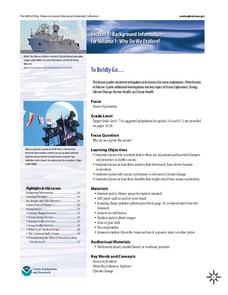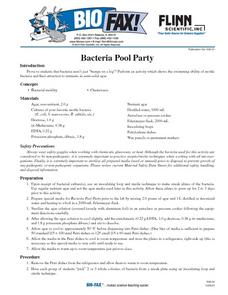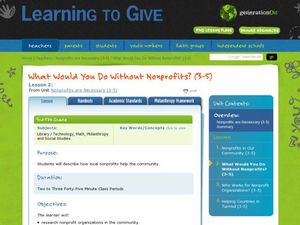John F. Kennedy Presidential Library & Museum
Red States/Blue States: Mapping the Presidential Election
Young historians investigate how voting patterns have changed by comparing the outcome of the 1960 election to the outcome of the recent election. A creative final assessment has participants making a news show wherein they provide...
NOAA
Journey to the Unknown
What's it like to be a deep-sea explorer? Tap into the imaginations of your fifth and sixth graders with a vivid activity, the second part of a six-part adventure. Learners close their eyes and submerge themselves in an expedition aboard...
College Board
2008 AP® English Language and Composition Free-Response Questions
Are your high school scholars ready for college?
Administering the 2008 AP® English Language and Composition Free-Response
Questions tells much about a
pupil's readiness for high level English courses. The resource offers three
questions...
Curated OER
Journeys: A Common Core State Standards Unit for A Wrinkle in Time and Companion Texts
You won't find any wrinkles in your instruction with this unit guide on Madeleine L'Engle's A Wrinkle in Time. The 34-page document includes everything from instructional questions and learning tasks aligned to Common Core State...
PBS
NOVA Cybersecurity Lab Lesson Plan
Don't be fooled by cyber scams! An informative lesson teaches techies about cybersecurity. They watch videos, play a game, and engage in discussion to improve their understanding of online safety.
Curated OER
Book Jacket Match: Practice with the Dewey Decimal Classification System
As a follow-up activity to being introduced to the Dewey Decimal Classification System, 3rd graders listen to poems from Jackie Mims Hopkins' book The Shelf Elf Helps Out and sort book jackets by category and call number.
Curated OER
A House is a House for Me: Library Skills for Young Readers
Read Mary Ann Hoberman's book A House is a House for Me to introduce the idea that a library is a house for shelves of books. Young readers practice alphabetizing in the picture book (easy fiction) section of the library. They learn how...
NOAA
To Boldly Go...
When we think of ocean exploration, many of us have visions of sunken pirate ships full of treasure or mysterious creatures of the deep. What really motivates deep-sea investigation? The first in a series of diverse six-part lessons...
Curated OER
Naming New Species
Students explore science of taxonomy and the Five Kingdoms of life,
categorize organisms into Kingdoms, and create multi-media presentations illustrating knowledge of a Kingdom. They collect data and related pictures on the Internet,...
Curated OER
Pathfinders: Using Information Resources
Eighth graders gather and use information on a chosen topic for a hypothetical research paper. They use organizational features of printed text, the Internet, and other media to locate information and choose a specific topic.
Curated OER
Bird Up
Third graders identify basic physical and behavioral characteristics of birds and how they adapt to their environments. To organize and share scientific information with peers. They discuss similarities and differences among birds....
Curated OER
Louisiana Regional Foodways
Learners strengthen their research techniques in locating, selecting, and synthesizing information from a variety of texts, media, references and internet resources to study regional food way traditions in Louisiana. They assess the...
Curated OER
Biography Research Unit
Sixth graders work with the library media specialist as they listen to biography booktalks. They choose a biography and conduct further research on the subject of the biography. Finally, they prepare a videotape on the life of the person...
Curated OER
Volcano Research
Student demonstrates the ability to select and evaluate media. They access and organize information about volcanoes. Each student locates on a map a currently erupting volcano.
Curated OER
Bacteria Pool Party
Students investigate the organisms of bacteria. They are given a culture of bacteria that can be observed under a microscope. The students make observations that are recorded. The lesson includes the mention of specific safety...
Curated OER
The Giver: A Research Unit
Eighth graders complete a reading of Lois Lowry's, The Giver, and determine a social problem the effects the "utopian society." They research information about the social problem using a number Internet, print, and media resources. They...
Curated OER
What Would You Do Without Nonprofits?
Students research nonprofit organizations within their community. In this nonprofits lesson, students use the yellow pages to identify the number of nonprofit organizations in their community. Students graph the number of nonprofit...
Curated OER
Organization 1: Look at What I Organized!
Pupils recognize that organizing things can make it easier to find things later.
Curated OER
Do You Have the Guts?
Seventh graders Name and locate the major internal organs of the human body and the frog. Students virtually dissect a frog and compare organs to the human organs. Students draw illustrations of their learnings.
Curated OER
I Need Air
Students examine and research the organs of the respiratory system. They participate in a vocabulary card matching game, create a graphic organizer, and participate in an experiment titled, Floating on Air.
Curated OER
Chemical Formulas
Students examine the structure of molecules, their formula, and percentage composition of each element in the compound. They construct an organic compound with different functional groups using a modeling kit, and draw a 3-D structure...
Curated OER
Express Yourself Lesson Seed 17: Obituary
The Cay has been criticized by groups such as the Council on Interracial Books for Children because of the way race is portrayed. Explore the argument against the book while taking the author's perspective into account. Class members...
Curated OER
The Heart of the Matter
Upper elementary pupils learn about the blood transportation system and anatomy of the human heart. They fill in an outline of the human heart (not included) focusing on the flow of blood to and from the heart. Using stethoscopes, they...
Stanford University
Hurricane Katrina
The adage says that journalism is the first draft of history. How should people evaluate these sources of information? Taking into account various sources, including those from various perspectives and different creators, learners...

























